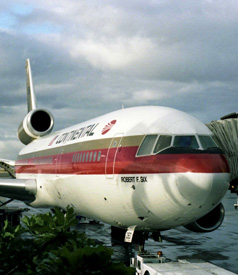Did you know that Truthout is a nonprofit and independently funded by readers like you? If you value what we do, please support our work with a donation.
The Teamsters Union’s February 12 election victory to represent 7,600 ground workers at Continental Airlines shows that good old-fashioned hard work might be making a comeback.
Several hundred union organizers fanned out across the country and knocked on doors in 24 cities in preparation for the vote. This time, Teamsters volunteers did not limit themselves to the large Continental hubs in Cleveland, Houston and Newark, as other unions had done in failed organizing efforts over the last 12 years.
“We’ve been through this five times and I can say hands down that this is the best campaign, the strongest campaign we’ve had,” Gary Welsch accurately predicted to Teamster Magazine in September 2009, several months before the election.
While air transportation remains among the most heavily unionized industry in the country, Continental ramp agents were also among the largest single group of non-union employees. Now they have made the nation’s fourth-largest airline a union shop from top to bottom.
The airline’s pilots, flight attendants, mechanics and now ground workers all have collective bargaining rights, giving them an advantage in recovering some of the lost ground over the last few years.
“Wages for the ramp workers start at about $10 an hour,” said Chris Moore, chairman of the Teamsters Aviation Mechanics Coalition, but only “about half work full-time.” After 10 years, lead agents earn a little more than $21 an hour, he said.
The lingering issue of low pay, combined with the post-September 11, 2001, severe cuts in service, dramatic reductions of routes and draconian layoffs of employees certainly increased union awareness among employees, but the achievements of the union’s national strategy must also be recognized.
In a rather bleak year for organized labor, the result of all the hard work is a big cause for celebration.
For the Teamsters, who organized 43,000 new members in 2008, it is affirmation of their strategy that relies heavily on hundreds of trained and dedicated rank-and-file members who attend an “Organizers’ Bootcamp‚” where they learn the skills to participate in recruiting workers to the union.
Votes Counted Even When You Don’t Vote
Probably the most outrageous anachronism in US labor law is the 1926 Railroad Labor Act (RLA) regulation governing union elections for rail and airline workers. The RLA requires what union activists call a “super majority” before any union can win an election.
The rule states that the union must win the support of the majority of the total class and craft bargaining unit. This is unlike every other election in the United States where the outcome is decided by a majority of those who actually cast a ballot, not on a majority of the total eligible electorate.
To make it even worse, the bargaining unit includes those on layoff who are, of course, difficult to contact. In effect, those not voting out of apathy or because they could not be reached, are counted as “No” votes.
The Transport Workers Union (TWU) won a clear majority of those voting, but lost the election for Continental ground workers in 2008 because it fell short of this “super majority” requirement by 314 votes. The Machinists (IAMAW) union lost at Continental under the same circumstances a few years earlier.
The Teamsters narrowly won their election by surpassing this threshold by only 300 votes, though the 4,102 workers who voted for the union were an overwhelming majority of those voting.
Fortunately, the National Mediation Board (NMB), which administers the RLA, has recommended changing the rule to a simple majority of those voting. Of course, air and rail carriers are protesting, but labor is very confident the NMB recommendation will ultimately prevail.
It was a remarkable risk for the Teamsters to proceed with the Continental election under the old rules. They were very confident of their support. “We took a gamble and it worked,” said a beaming Teamster President James Hoffa.
Other unions, such as the Flight Attendants (AFA-CWA) and the Machinists have postponed pending elections at Delta, for example, until the new rule change is expected to take effect in a few months.
Under the RLA, workers are only asking for the same rights as other voting Americans. With genuine majority-rule elections, airline unions would have won every single contest in the past twenty years.
Under the National Labor Relations Act (NLRA), covering non-RLA workers, union elections are tainted by well-documented employer threats of recrimination, termination and discrimination. The Employee Free Choice Act (EFCA) would allow workers to indicate their choice of a union away from intimidating employer scrutiny.
Workers at Continental spoke for millions who so desperately need collective bargaining rights in these so very desperate times. Modernizing and democratizing election rights, in both the RLA and NLRA, will greatly advance opportunities for working people to organize themselves and to express their demands and desires for a better life.
Of course, these same opportunities explain the fierce opposition of the corporate sector.
Trump is silencing political dissent. We appeal for your support.
Progressive nonprofits are the latest target caught in Trump’s crosshairs. With the aim of eliminating political opposition, Trump and his sycophants are working to curb government funding, constrain private foundations, and even cut tax-exempt status from organizations he dislikes.
We’re concerned, because Truthout is not immune to such bad-faith attacks.
We can only resist Trump’s attacks by cultivating a strong base of support. The right-wing mediasphere is funded comfortably by billionaire owners and venture capitalist philanthropists. At Truthout, we have you.
Truthout has launched a fundraiser to raise $34,000 in the next 5 days. Please take a meaningful action in the fight against authoritarianism: make a one-time or monthly donation to Truthout. If you have the means, please dig deep.
